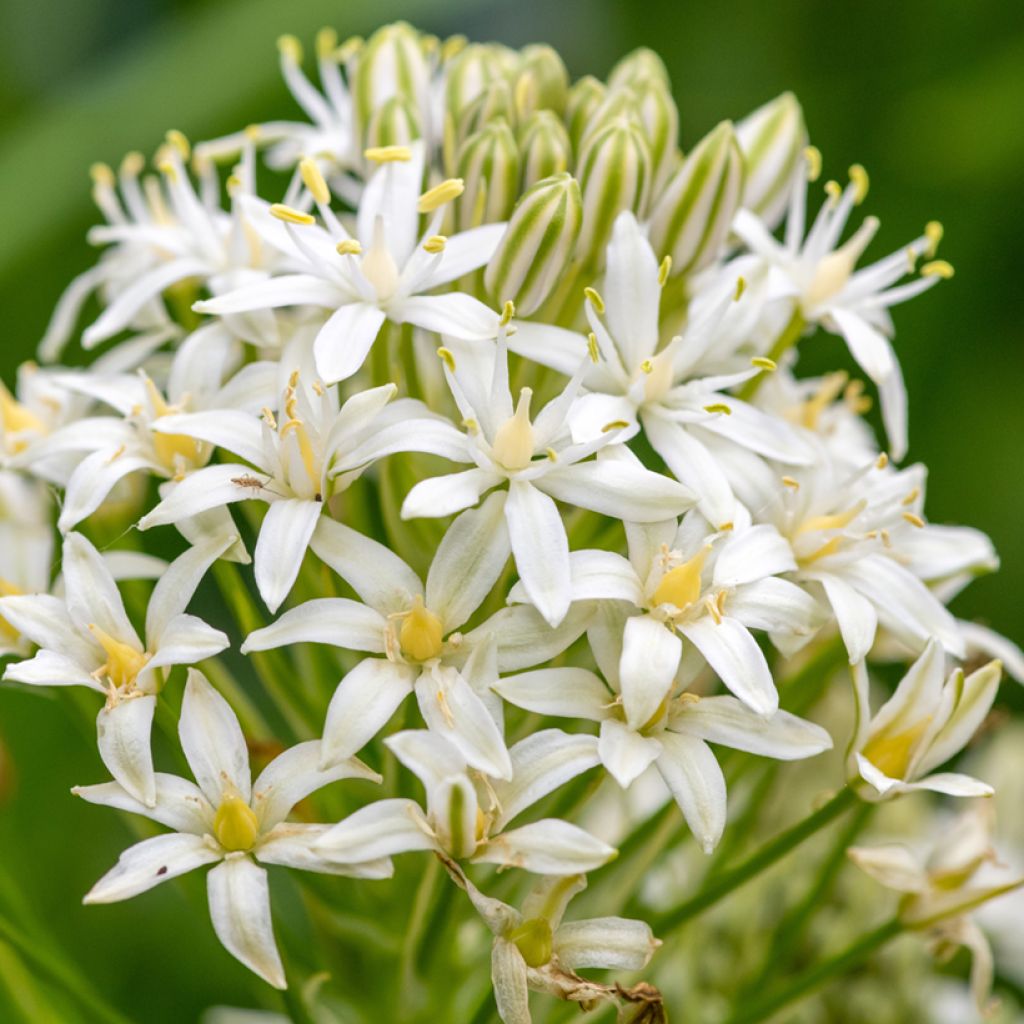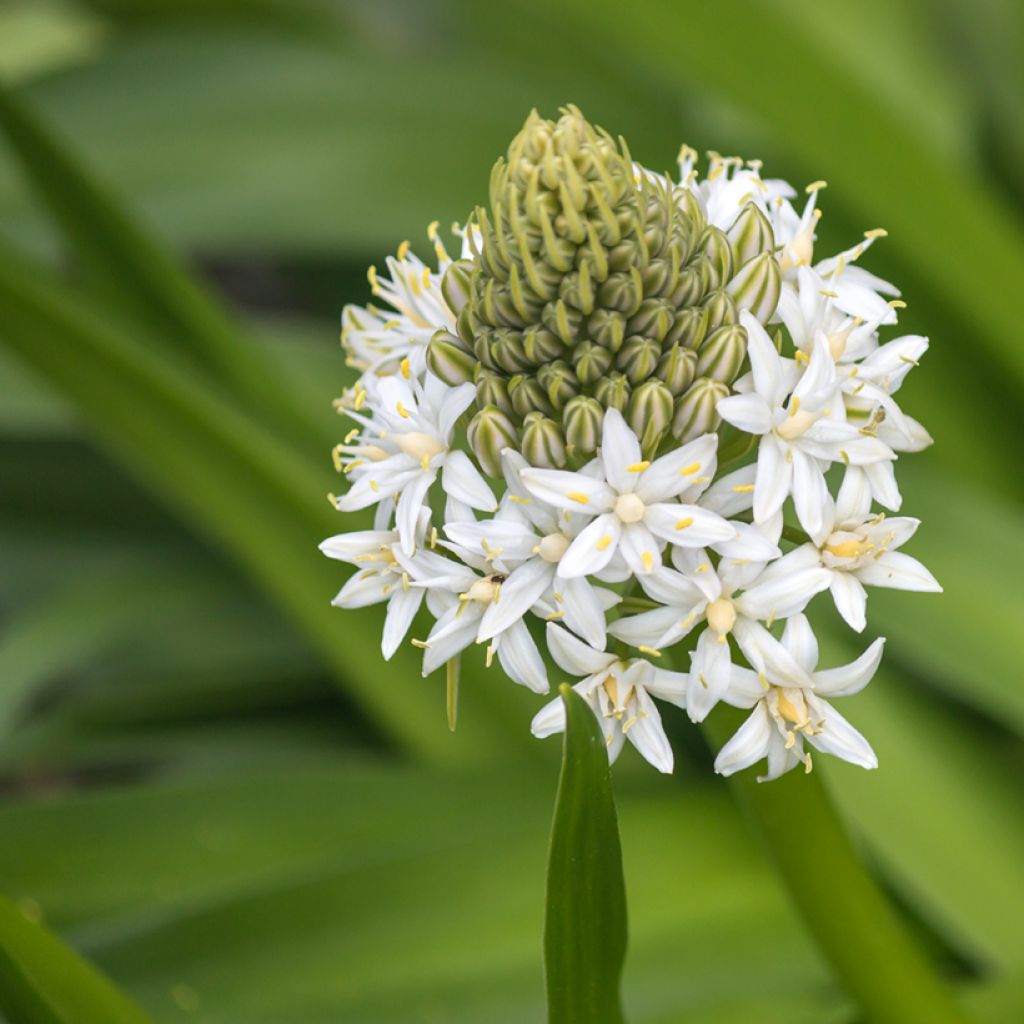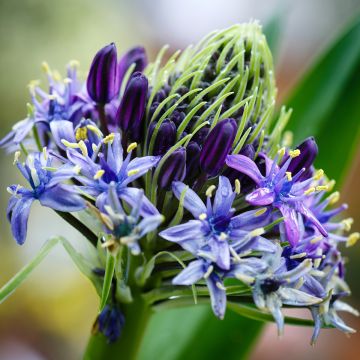

Scilla peruviana White Moon


Scilla peruviana White Moon
Scilla peruviana White Moon
Scilla peruviana White Moon
Portuguese Squill, Cuban Lily, Peruvian Lily
This plant carries a 6 months recovery warranty
More information
We guarantee the quality of our plants for a full growing cycle, and will replace at our expense any plant that fails to recover under normal climatic and planting conditions.
From €5.90 for pickup delivery and €6.90 for home delivery
Express home delivery from €8.90.
Does this plant fit my garden?
Set up your Plantfit profile →
Description
Scilla peruviana 'White Moon' is a variety of Peruvian Squill that stands out for its star-shaped flowers in pure white. They cluster together on a large conical inflorescence. It is a bulbous plant with quite spectacular spring flowering. Easy to grow in Mediterranean climates, in soil that is not too dry in spring, it also thrives in gardens further north, provided it is given perfect drainage and a very sunny exposure. Growing it in pots allows for better control of the growing conditions in less favourable climates.
Scilla peruviana 'White Moon' is a horticultural selection that was introduced to gardening enthusiasts at the RHS Chelsea Flower Show in 2019. This cultivar produces large 10 cm diameter heads, each containing up to 100 small star-shaped, pure white flowers. Even before opening, the cone-shaped inflorescences are astonishing. With a large layered bulb, this squill develops a large tufted rosette of foliage during autumn and winter; it consists of long lanceolate dark green, shiny leaves, forming a tuft. In May-June, depending on the climate, each clump of leaves produces a 20 to 30 cm tall flower stalk in its centre, bearing at its tip a large corymb where numerous small flowers cluster together. Once the flowering is over, the foliage dries up and disappears until the following autumn.
Contrary to what its name suggests, Scilla peruviana (syn. Oncostema peruviana) is not native to Peru, but to the Mediterranean region. It was transported from Spain to England in the holds of the ship "La Peruviana"; the botanist who described it made an unfortunate confusion with the name of the ship and its geographical origin. A plant of the Lily family, the Peruvian squill is native to Portugal, Italy, Spain, and North Africa. Its natural habitat consists of bushes, meadows, humid rocky areas, or coastal regions of these countries. Quite sensitive (-10°C) in wet soil, we therefore advise you to ensure good soil drainage and to mulch it in cooler climates.
This Peruvian squill 'White Moon' can be used in borders, rockeries, or even in pots. It fits well in a small Mediterranean composition, with Madonna Lilies, autumn crocus imposters, Algerian iris, and hybrid hyacinths. It also finds a place in borders or at the base of spring-flowering shrubs. A plant for well-drained soils, it also thrives in rockeries, where it does not require any particular care.
Report an error about the product description
Scilla peruviana White Moon in pictures


Plant habit
Flowering
Foliage
Botanical data
Scilla
peruviana
White Moon
Asparagaceae
Portuguese Squill, Cuban Lily, Peruvian Lily
Scilla hemisphaerica, Oncostema peruviana
Cultivar or hybrid
Other Scilla
Planting and care
The 'White Moon' Peruvian Squill should be planted in full sun in the north, or at most in partial shade in southern regions. Moderately hardy in moist soil during winter, down to -10°C, it can withstand much lower temperatures in dry soil. Plant the bulbs from summer until September, in light soil, enriched with compost, rather moist but well-drained, at a depth of 10 cm and spacing of 15 cm. Leave the plant in place for several years, as it does not like to be moved. Mulch in winter!
Planting period
Intended location
Care
This item has not been reviewed yet - be the first to leave a review about it.
Haven't found what you were looking for?
Hardiness is the lowest winter temperature a plant can endure without suffering serious damage or even dying. However, hardiness is affected by location (a sheltered area, such as a patio), protection (winter cover) and soil type (hardiness is improved by well-drained soil).

Photo Sharing Terms & Conditions
In order to encourage gardeners to interact and share their experiences, Promesse de fleurs offers various media enabling content to be uploaded onto its Site - in particular via the ‘Photo sharing’ module.
The User agrees to refrain from:
- Posting any content that is illegal, prejudicial, insulting, racist, inciteful to hatred, revisionist, contrary to public decency, that infringes on privacy or on the privacy rights of third parties, in particular the publicity rights of persons and goods, intellectual property rights, or the right to privacy.
- Submitting content on behalf of a third party;
- Impersonate the identity of a third party and/or publish any personal information about a third party;
In general, the User undertakes to refrain from any unethical behaviour.
All Content (in particular text, comments, files, images, photos, videos, creative works, etc.), which may be subject to property or intellectual property rights, image or other private rights, shall remain the property of the User, subject to the limited rights granted by the terms of the licence granted by Promesse de fleurs as stated below. Users are at liberty to publish or not to publish such Content on the Site, notably via the ‘Photo Sharing’ facility, and accept that this Content shall be made public and freely accessible, notably on the Internet.
Users further acknowledge, undertake to have ,and guarantee that they hold all necessary rights and permissions to publish such material on the Site, in particular with regard to the legislation in force pertaining to any privacy, property, intellectual property, image, or contractual rights, or rights of any other nature. By publishing such Content on the Site, Users acknowledge accepting full liability as publishers of the Content within the meaning of the law, and grant Promesse de fleurs, free of charge, an inclusive, worldwide licence for the said Content for the entire duration of its publication, including all reproduction, representation, up/downloading, displaying, performing, transmission, and storage rights.
Users also grant permission for their name to be linked to the Content and accept that this link may not always be made available.
By engaging in posting material, Users consent to their Content becoming automatically accessible on the Internet, in particular on other sites and/or blogs and/or web pages of the Promesse de fleurs site, including in particular social pages and the Promesse de fleurs catalogue.
Users may secure the removal of entrusted content free of charge by issuing a simple request via our contact form.
The flowering period indicated on our website applies to countries and regions located in USDA zone 8 (France, the United Kingdom, Ireland, the Netherlands, etc.)
It will vary according to where you live:
- In zones 9 to 10 (Italy, Spain, Greece, etc.), flowering will occur about 2 to 4 weeks earlier.
- In zones 6 to 7 (Germany, Poland, Slovenia, and lower mountainous regions), flowering will be delayed by 2 to 3 weeks.
- In zone 5 (Central Europe, Scandinavia), blooming will be delayed by 3 to 5 weeks.
In temperate climates, pruning of spring-flowering shrubs (forsythia, spireas, etc.) should be done just after flowering.
Pruning of summer-flowering shrubs (Indian Lilac, Perovskia, etc.) can be done in winter or spring.
In cold regions as well as with frost-sensitive plants, avoid pruning too early when severe frosts may still occur.
The planting period indicated on our website applies to countries and regions located in USDA zone 8 (France, United Kingdom, Ireland, Netherlands).
It will vary according to where you live:
- In Mediterranean zones (Marseille, Madrid, Milan, etc.), autumn and winter are the best planting periods.
- In continental zones (Strasbourg, Munich, Vienna, etc.), delay planting by 2 to 3 weeks in spring and bring it forward by 2 to 4 weeks in autumn.
- In mountainous regions (the Alps, Pyrenees, Carpathians, etc.), it is best to plant in late spring (May-June) or late summer (August-September).
The harvesting period indicated on our website applies to countries and regions in USDA zone 8 (France, England, Ireland, the Netherlands).
In colder areas (Scandinavia, Poland, Austria...) fruit and vegetable harvests are likely to be delayed by 3-4 weeks.
In warmer areas (Italy, Spain, Greece, etc.), harvesting will probably take place earlier, depending on weather conditions.
The sowing periods indicated on our website apply to countries and regions within USDA Zone 8 (France, UK, Ireland, Netherlands).
In colder areas (Scandinavia, Poland, Austria...), delay any outdoor sowing by 3-4 weeks, or sow under glass.
In warmer climes (Italy, Spain, Greece, etc.), bring outdoor sowing forward by a few weeks.



































